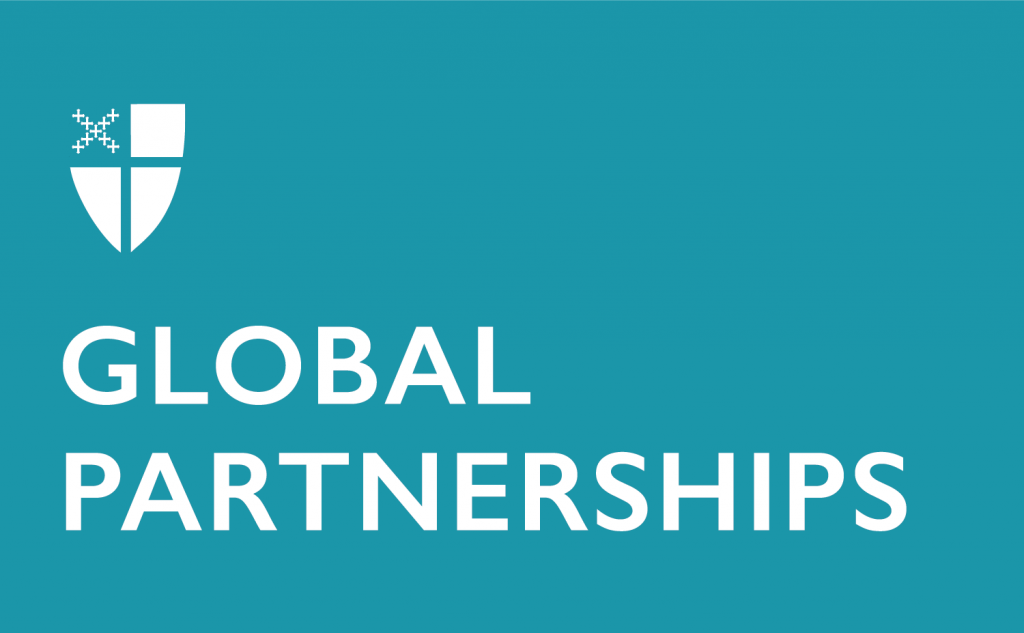Walking in Two Worlds: Bishop Katharine and the Office of Indigenous Ministries at the United Nations Permanent Forum on Indigenous Issues
In commemoration of the International Day of the World’s Indigenous Peoples (August 9th), the Global Partnerships Office has been featuring a four-part interview with Nellie Adkins (Chickahominy, Diocese of Virginia), one of fourteen Anglican/Episcopal delegates who participated in the 11th session of the United Nations Permanent Forum on Indigenous Issues as part of the Anglican Communion’s delegation. The interview runs on this blog every Thursday, August 9th – 30th. Last week, Nellie shared what it was like to be on the floor of the Permanent Forum. Today, she talks about Presiding Bishop Katharine Jefferts Schori and Sarah Eagle Heart’s work with indigenous peoples in repudiating the Doctrine of Discovery, and their witness of presence at the Permanent Forum.
We hope you will enjoy Part Two of the interview with Nellie, and return next week to hear about Nellie’s experiences advocating at the UN and back home, and what it is like to “walk between two worlds”, bringing messages from home and back again.
Global Partnerships: I understand that Bishop Katharine was actually at the Permanent Forum as well to represent the Church?
Nellie Adkins: She was. And she actually did a panel presentation [sponsored by the Office of Indigenous Ministries] in which she certainly adroitly articulated the whole
Bishop Katharine presents during the “Churches Disavow the Doctrine of Discovery” panel sponsored by the Office of Indigenous Ministries
[repudiation of the Doctrine of Discovery]. But then she was on the floor, at the UN Permanent Forum on Indigenous Issues, and she just sat there, she listened; it wasn’t like she got up and banged a drum or anything, but just the serenity of her presence, you know, the ongoing beat of life. My dad used to say “What you are speaks so loudly that I cannot hear what you are saying”. She didn’t have to say anything. Her message was loud and clear to me. And I was sooooo proud of her; my heart was so gladdened just to see her there. And I want to tell you that no indigenous person missed a beat on that. They saw her. And it spoke volumes.
GP: We’re very proud of Bishop Katharine and Sarah [Eagle Heart], especially, our Indigenous Ministries Missioner, for heading up this delegation of fourteen. We were also part of an ecumenical caucus and the written statement that Sarah helped to put together with the World Council of Churches and the Anglican Church of Canada. Did you have any contact with anyone from the WCC or any other Christian churches while you were at the Forum?
NA: Yes. A number of people came up and engaged me in dialogue… So I know that there are people on board, who are standing on the edge of the circle and watching and observing with keen interest.
Bishop Katharine (L) and Sarah Augustine (R), representing the World Council of Churches, on the floor of the UN Permanent Forum
GP: How many countries or areas of the world would you say you saw represented at the UN Permanent Forum?
NA: I would say three quarters of the world was represented.
GP: And in terms of regions? Did you see people from South America, Asia and the Pacific…?
NA: I would say all regions, including the Arctic.
GP: Did it seem that the indigenous people who came were able to speak freely? And were they given the space to dialogue and to express from their own perspectives what the issue means to them?
NA: Most definitely. In fact, I think they probably have more freedom at this Permanent Forum than they do at home. I heard a lot of fear being voiced and it really concerned me. We operate in such freedom here, comparatively speaking. By due process of law, if you want to voice your opinions, you have the freedom to do that. You have the right to protest; you have the right to disagree. I was in a Forum where I heard women say, “Well, you know, we’re doing really well now. We finally, if you’re married, we finally got the right to go outside without our husbands.” And I thought, “Gosh, if I didn’t have that right I’d be dead”, because I’m out all the time, you know? And I just thought, “How can that be?”, but it is how it is. And I think when you operate in basically relatively unleashed freedom, you may be clueless about that. You may think that you’re very smart and that you’re very knowledgeable, but you may be very clueless to the reality that belongs to the majority of the world…I think we really have to focus on women, because that’s an area where in many places it’s still a man’s world. Men can go out and do whatever they want, but a woman is still in some places chattel property. And that disturbs me.

